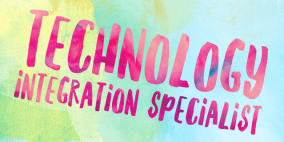
I had a unique and unexpected learning experience yesterday. I attended Edcamp Exit 8a, the first edcamp ever hosted by the New Jersey Principals and Supervisors Association (NJPSA). It was their first edcamp, and it also happened to be the first NJPSA event that I had ever attended. As an aspiring administrator, I had just joined the organization and literally received my welcome letter the day before this edcamp.
So there I was, in a room that was predominantly occupied by all kinds of administrators, from supervisors to principals to district-level admins. There was also a smattering of technology experts, coaches, and teachers with various experience. As a new member, I was ready to learn from all of these people.
Something unexpected happened. The edcamp session board, which is always populated on the spot by volunteers from the audience, just wasn’t filling up. As the minutes ticked on and I saw so many vacancies on the grid, I decided to put myself out there and volunteer to present. As even more time passed and the need remained evident, I signed up for two more session presentations (there were only 3 sessions that day) and hoped for the best. I’ve been to well over a dozen edcamps and figured I could facilitate a discussion – or three. To be honest, at that point, I was a little disappointed because my goal had been to come as a learner and to tap into the experience and expertise of others.
It’s my first session that had enough of an impact on me to have me thinking and blogging about it today. My session was titled, “What Is A Technology Integration Specialist?” I am brand new to this role (officially), and I shared that with the group right off the bat. I used an infographic that I had recently created as the basis for the session. (Click HERE for the full infographic, but here’s a small snapshot:
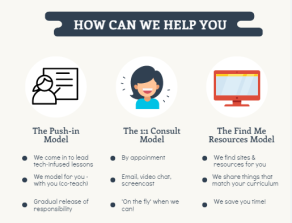
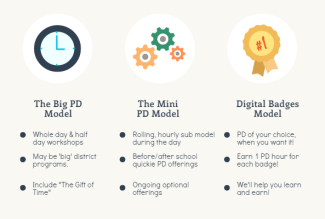
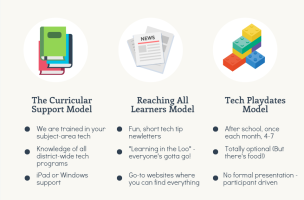
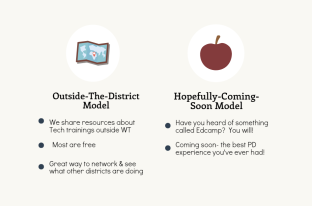
As you can see, the focus was on what tech integration specialists can DO. I explained to the session participants that this was a newly-created position, and that my goal was to present this infographic to the staff members I would be serving in order to show all the ways I can provide services. The response to the ideas was very much favorable, which was validating, to say the least. I was honored that administrators found my delivery models and strategies worthy of replication in their own districts.
The best part came next, though. They started to give me advice. In true edcamp style, the session became a discussion, and the experts in the room began sharing experiences from their own districts. They wanted to help me avoid pitfalls and be successful in my new vocation. The learning I had come for – had craved – was happening as a result of my topic and the collegiality of educational professionals who care!
Here are a few of the extremely valuable revelations they shared:
- Have critical discussions with different administrators first. Often a tech integration specialist works under several different principals and supervisors. My friend Rich Czyz (@RACzyz), a NJ principal and former instructional coach, said that it’s really important to see what each building leader expects and to get a feel for the culture of each school. It’s also important to work with the principal/supervisor to establish how things will be presented to staff, what expectations will be for all involved, and how we can support each other to improve technology integration in the school.
- One great example involves how to approach teachers who are reluctant to welcome any ‘coach’ into their room…will the principal have that discussion with those teachers and pave the way? Does the supervisor prefer that no “push-in” coaching is done without an invitation by the teacher?
- Be clear with staff about what Technology Integration Specialists DON’T do, too. I loved this advice because I hadn’t considered it – and it’s important. One supervisor in the room said that teachers in his school had taken advantage of the fact that another adult was entering the room. Some teachers sat at their desks to grade papers; others actually left the room! In his district, the administrators intervened and explained to the staff that when any ‘coach’ enters the room, it is to help that teacher via new learning, practice, or support. He explained that it is critical to establish this expectation (with administrative support) to every teacher. He also advised that I stay firm if/when teachers may try to take advantage, and to not make exceptions. “Be rigidly consistent” was the exact advice.
- Let teachers know that a Tech Integration Specialist is NOT any type of administrator. This was great advice, too! Many teachers get nervous or even resentful another adult coming into their classrooms. One principal told me that it’s really important to get the word out from the get-go that I will never conduct an observation or be judgmental in any way. Classroom teachers and tech integration specialists are compatible (lateral) positions. She advised that I repeat that fact early and often.
As you can see, I left with new insights, new knowledge, and new ideas. Perhaps I started as a presenter, but I finished as a learner. I also ended up with some new contacts and remarkable connections. I’d say that’s growth, and I know that’s exactly the kind of gift that edcamps make possible.
If you have any other advice for me – or thoughts, comments, or opinions, I hope you’ll take the time to comment. You can reach me here at my blog (kerszi.wordpress.com), on Twitter at @kerszi, or follow my Facebook page, which is called Integration Innovation.
I currently am on a district tech team that provides PD sessions after school although I am applying for a tech coaching position as well. yYour ideas and tips were very timely and valuable for me. Looking forward to following your journey and learning from you!
LikeLike
Hi, I just found your blog , and I love it. I am new to the tech integration field as well. Check out my new blog at https://njcybrarianblog.wordpress.com/
LikeLike